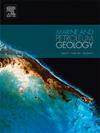微裂缝记录的盆地结构与流体的耦合演化:塔里木盆地深埋奥陶纪案例研究
IF 3.7
2区 地球科学
Q1 GEOSCIENCES, MULTIDISCIPLINARY
引用次数: 0
摘要
沉积盆地深部地层的流体活动通常与构造活动有关,而裂缝中充填的胶结物是构造-流体耦合演化的良好载体。与大断裂相比,微断裂具有频率高、周期易识别的特点。塔里木盆地台盆区奥陶系英山地层和易家坊地层碳酸盐岩中发育有丰富的碳酸盐岩胶结物充填微断裂(MCCFs)。本研究在岩石学、U-Pb测年和地球化学特征研究的基础上,确定了MCCFs的阶段,阐明了研究区MCCFs所记录的构造-流体耦合演化过程。这些 MCCF 的形成顺序为 D1、C1、C2、D2、C3 和 C4。MCCFs 的降水时间与塔里木盆地周围的造山运动和平台盆地地区走向滑动断层的活动时间有很好的对应关系。SLU奥陶系英山地层和易家坊地层中的六个阶段的MCCFs记录了中奥陶统晚期浓海水、奥陶统晚期陨石水、志留纪有机酸、泥盆纪末石炭纪初富镁热卤水和二叠纪岩浆热液的构造-流体耦合演化过程。这不仅表明了沉积盆地中流体活动与构造活动之间的密切联系,而且证实了碳酸盐岩层中 MCCFs 的形成与区域构造-流体耦合活动密切相关。这项研究为利用微裂缝研究盆地中宏观尺度的构造-流体耦合活动提供了一个很好的范例。本文章由计算机程序翻译,如有差异,请以英文原文为准。
Coupled evolution of basin structure and fluids recorded by microfractures: A case study of deep-buried ordovician in the tarim basin
The fluid activity in the deep strata of sedimentary basins is commonly related to tectonic activity, and the cements filled in fractures are a good carrier for the tectonic-fluid coupling evolution. Compared to macrofractures, microfractures have characteristics of high frequency and easy identifiable periods. Abundant microfractures infilled by carbonate cements (MCCFs) developed in carbonates of the Ordovician Yingshan and Yijianfang formations in the platform basin area of the Tarim Basin. Based on the study of petrology, U-Pb dating, and geochemical characteristics, this study determined the stages of MCCFs and clarified the tectonic-fluid coupling evolution process recorded by MCCFs in the study area. The formation order of these MCCFs is D1, C1, C2, D2, C3, and C4. The precipitation times of MCCFs have a good correspondence with orogeny around the Tarim Basin and active times of strike-slip faults in the platform basin area. The six stages of MCCFs in the Ordovician Yingshan and Yijianfang formations in the SLU recorded the tectonic-fluid coupling evolution process of concentrated seawater in the late Middle Ordovician, meteoric water at late Ordovician, organic acids during the Silurian, Mg-rich hot brine at the end Devonian-early Carboniferous, and magmatic hydrothermal fluids during the Permian. This not only indicates a close connection between fluid activity and tectonic activity in sedimentary basins, but also confirms that the formation of MCCFs in carbonate formations is closely related to regional tectonic-fluid coupling activities. This study provides a good example for studying macro scale tectonic-fluid coupling activities in basins using microfractures.
求助全文
通过发布文献求助,成功后即可免费获取论文全文。
去求助
来源期刊

Marine and Petroleum Geology
地学-地球科学综合
CiteScore
8.80
自引率
14.30%
发文量
475
审稿时长
63 days
期刊介绍:
Marine and Petroleum Geology is the pre-eminent international forum for the exchange of multidisciplinary concepts, interpretations and techniques for all concerned with marine and petroleum geology in industry, government and academia. Rapid bimonthly publication allows early communications of papers or short communications to the geoscience community.
Marine and Petroleum Geology is essential reading for geologists, geophysicists and explorationists in industry, government and academia working in the following areas: marine geology; basin analysis and evaluation; organic geochemistry; reserve/resource estimation; seismic stratigraphy; thermal models of basic evolution; sedimentary geology; continental margins; geophysical interpretation; structural geology/tectonics; formation evaluation techniques; well logging.
 求助内容:
求助内容: 应助结果提醒方式:
应助结果提醒方式:


